





 Weekly Specials
Weekly Specials |






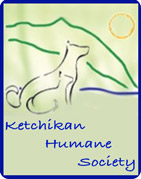

 Contact Contact 
 Call 617-9696 Call 617-9696
 Webmail
Letters Webmail
Letters
 News Tips News Tips 
 Copyright Info Copyright Info
 Archives Archives
Quick News
Search
 Alaska Alaska
 Ketchikan Ketchikan
 SE Alaska SE Alaska
 Alaska News Links Alaska News Links
Columns
- Articles
 Dave Kiffer Dave Kiffer
 Fish
Factor Fish
Factor
 Money Matters Money Matters
Historical
Ketchikan
 June Allen June Allen
 Dave
Kiffer Dave
Kiffer
 Louise
B. Harrington Louise
B. Harrington
Ketchikan
Arts & Events
 Ketchikan
Arts Ketchikan
Arts
 Ketchikan
Museums Ketchikan
Museums
 KTN Public
Library KTN Public
Library
Sports
 Ketchikan Links Ketchikan Links
Public Records
 FAA Accident Reports FAA Accident Reports
 NTSB
Accident Reports NTSB
Accident Reports
 Court Calendar Court Calendar
 Recent Filings & Case Dispositions Recent Filings & Case Dispositions
 Court Records Search Court Records Search
 Wanted:
Absconders Wanted:
Absconders
 Sex Offender Reg. Sex Offender Reg.
 Public Notices Public Notices
Weather,
Webcams
 Today's
Forecast Today's
Forecast
 KTN
Weather Data KTN
Weather Data
 AK
Weather Map AK
Weather Map
 AK Weathercams AK Weathercams
 AK Earthquakes AK Earthquakes
TV Guide
 Ketchikan Ketchikan
Ketchikan
Phone Book
 Yellow
Pages Yellow
Pages
 White
Pages White
Pages
Government
Links
 Local Government Local Government
 State & National State & National

|
|

Saturday
October 10, 2015
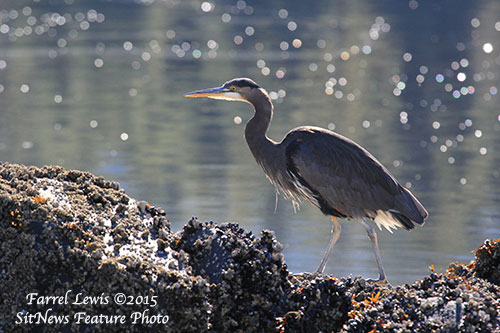
|
Traitor's Cove: Great Blue Heron
Front Page Photograph By FARREL LEWIS ©2015
Select your favorite Photo of the Month. The photographer with the most likes for the month will receive $100. Only LIKES on SitNews' Facebook page will be counted. If you don't use FB, email your choice to the editor.
(Submit your photograph to be featured on the SitNews' front page. Email photo to editor@sitnews.us include your name and a brief photo description.)
Southeast Feature: A Cruise Ship Goes Down; Sinking of the Prinsendam in 1980 led to One of history’s greatest maritime rescues By DAVE KIFFER - At the beginning of most cruise ship sailings, the passengers gather for a safety lecture. It's not really a drill because they don't get into lifeboats or rafts that are then cast off. What takes place is a muster drill in which passengers are told where to gather in an emergency and how to don a life vest.
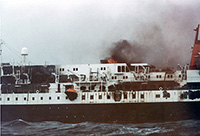
Sinking of the PRINSENDAM, October 4, 1980. The Prisendam was approximately 120 nautical miles south of Yakutat when the fire broke out.
U.S. Coast Guard Photograph
After all, cruise ship sailings are statistically exceptionally safe. Millions of people travel on them every year and while occasionally ships have problems, a full evacuation is almost never needed.
Once a decade or so a cruise ship faces a more serious problem, rarely, if ever, are passengers faced with a situation in which they have to completely abandon ship and remember those details they learned in their "muster" drills.
In fact, the nearly 1 million cruise passengers who visit Southeast Alaska yearly probably don't even give more than a passing thought to the chance their cruise may be interrupted by the multiple blasts of the ship's horn and the order from the captain to abandon ship.
But that is exactly what happened near Yakutat 35 years ago this month to one of ships in the Holland America fleet. A fire forced hundreds of passenger and crew of MS Prinsendam to abandon the ship before it sank in the Gulf of Alaska. No one died in the incident and some experts have labeled the evacuation one of the greatest in the history of maritime rescue.
On October 2, 1980, the Prinsendam left Ketchikan and headed to Glacier Bay before going into the Gulf of Alaska. Although the Southeast Alaska visitor season was over, the ship was on a special sailing from Vancouver, B.C. to Japan and other parts of Asia. It had made a single stop in Ketchikan, after leaving Vancouver.
By 2015 standards, the Prinsendam, at 427 feet, was tiny. Even in 1980, the ship was the smallest of the five in Holland America's fleet, although it was the newest and, in some ways, the jewel of the fleet. It had been built in 1973 at a cost of $50 million.
Passengers on the Prinsendam had paid between $3,125 and $5,075 for the 29-day voyage from Vancouver through the Inside Passage and then across the North Pacific to Japan, Shanghai, Hong Kong and Singapore. Some of the passengers were going to stay on an additional two weeks as the ship visited Malaysia, Sumatra, Bali and Java.
Its total of 524 passengers and crew also seems miniscule compared to modern ships in the Alaska fleet that have six or seven times that number. But the difficulties encountered in safely evacuating even that relatively small number of passengers and crew point out just what trouble could await if a similar disaster happened to one of the leviathans in the modern cruise industry.
Still, the evacuation was also a blue print for just how to successfully deal with such a disaster at sea. It became, what Josh Reppinger called in a 1981 article in Popular Mechanics, the "most successful large scale peacetime sea rescue in history." - More....
Saturday AM - October 10, 2015 |
|
Alaska - Nationwide: EPA's WOTUS Rule on Hold Nationwide By MARY KAUFFMAN - The U.S. Court of Appeals for the Sixth Circuit on Friday issued a nationwide stay against the enforcement of the Environmental Protection Agency’s (EPA) “Waters of the United States” (WOTUS) rule.
The WOTUS rule issued June 29, 2015, expanded the reach of both the Environmental Protection Agency and the Army Corps of Engineers and was an update to the Clean Water Act, a piece of legislation that has been adjusted several times since becoming effective in 1972. The update known as the Waters of the United States Rule (WOTUS) went in effect earlier this spring, giving federal agencies authority to regulate smaller streams and bodies of water, including temporary runoff.
The new rule was immediately challenged in ten different suits involving more than 30 states and scores of private parties. The WOTUS rule was considered to be a devastating blow to private property rights and an unlawful power grab by the EPA over virtually all bodies of water in the United States
The U.S. Sixth Circuit Court of Appeals decided Friday that the updated rule should be placed on hold while further work is done to determine the allowed scope of federal regulatory jurisdiction. While the newest version of the law is in limbo, the immediate previous version is in use. - More...
Saturday AM - October 10, 2015
Fish Factor: Alaskan Pollock Labeling - When is Alaska pollock not really Alaska pollock?
When it is listed as such by the Food and Drug Administration, which governs what every seafood product will be called in U.S. commerce.
For pollock, one of the most widely eaten seafoods in the U.S., the FDA applies the “Alaska” moniker to all fish of that species on its market list, regardless of where it is caught.
“So if the fish is caught in Korea or Japan or Russia, it still can be sold as Alaska pollock in the United States. And that’s not the case with Alaska salmon or halibut or Alaska crab,” said Pat Shanahan, Program Director for the trade group Genuine Alaska Pollock Producers.
“That’s why we are called the Genuine Alaska Pollock producers,” she quipped. “It’s not enough to say we’re just the Alaska pollock producers, because we could be from Russia.
The FDA’s Seafood List guidelines discourage use of ‘geographic descriptors’ in market names, but for more than 30 years that standard has not been applied to Alaska pollock. No one is quite sure how that came to be, but it likely stemmed from the boom in the Bering Sea pollock fishery that began in the early 1980’s, and the flood of new fish was simply tagged “Alaska” by federal bureaucrats. - More...
Saturday AM - October 10, 2015 |
|
Alaska: Alaska Historic Canneries Initiative Launched at Cordova Conference - Recognizing the role of the seafood industry in Alaska’s history, the Alaska Historical Society announced the Alaska Historic Canneries Initiative to document, preserve, and celebrate the history of Alaska’s commercial fish processing plants. The announcement was made at the Society’s recent annual conference in the historic fishing community of Cordova.
“Hundreds of canneries and fish processing plants dotted Alaska's coast, serving as economic engines and social hubs for communities around our state,” said Anjuli Grantham of Kodiak, chair of the initiative. “Today, our commercial fishing industry continues to thrive, but changes in the industry mean that many of these historic places are at risk of disappearing before their stories are recorded. The seafood industry is critical to the livelihoods of many Alaskans and it is central to the state’s identity. It is important to document and preserve these places, and record the stories of the fishermen and processors who define coastal Alaska.”
The initiative began as a grassroots effort among historians, with a panel focused on Alaska fisheries at last year’s AHS conference. In formalizing the initiative, the AHS’s goal is to establish an ongoing program of research into fisheries history, including a mini-grant program to assist students and others research local salmon canneries, herring reduction plants, floating processors, cold storage facilities, cod salteries, and other commercial seafood processing plants.
“This initiative relies on the knowledge and passion of local individuals to be successful,” Grantham said. “It can be as simple as donating photos of Alaska canneries to a local historical society or organizing a storytelling event among fishermen and cannery workers. Ultimately, we hope to develop a preservation plan for a cannery. Regardless of the size of the project, all these fit within the initiative’s goal to document these places that matter to so many Alaskans.” - More...
Saturday AM - October 10, 2015
Southeast Alaska: Polls show Alaska and British Columbia support for shared watershed protection - Two new polls show Alaskans and British Columbians overwhelmingly support increased protection for water, fish, jobs and culture from mining development taking place in northwest British Columbia (B.C). The region includes the transboundary watersheds of the Taku, Stikine and Unuk Rivers that originate in B.C. and flow into Alaska.
“Time and again, Alaskans have raised concerns about upstream mining in B.C. and now polling shows B.C. citizens share our concerns and are less likely to support mines that could impact downstream resources. This provides a clear mandate for significant action by government and industry to ensure B.C.’s mining development doesn’t harm salmon, water quality, jobs and way of life downstream,” said Heather Hardcastle, Salmon Beyond Borders campaign director and commercial fisherman.
The two polls, one in Alaska and one in B.C., were commissioned by Salmon Beyond Borders in Alaska and SkeenaWild in B.C., and were conducted by Greenberg Quinlan Rosner Research. A summary of the results include: - More...
Saturday AM - October 10, 2015
|
Columns - Commentary
DAVE KIFFER: How Slow Can You Go? - Like all other 21st Century Men, I am obsessed with the size of my………… internet connection.
Yes. yes, I realize that when you are talking about internet connections you are talking about "speed" and not "size." But somehow obsessing about speed seems particularly shallow. Especially in a place like Ketchikan where there really is nowhere to go, no matter how fast you can get there.
I remember how everyone was so obsessed with fast cars when I was growing up. It was the end of the true muscle car era and people had GTOs and Chargers and Firebirds and Camaros. One guy even had a Challenger that ran on some special drag racer fuel. He could supposedly get the thing up to 150 mph. Not on any of our roads, of course. The smallest bump - of which we have many - at that speed would lead to violations of a variety of FAA flight safety rules. That guy's tray tables were NEVER in their upright and locked position.
Those were the days when jets still landed on the runway at Annette. Now, I guess you can go over there and "air out" your vehicle on the old runways.
Here the best you could do was "air out" your car on that mile long straight stretch near the Lighthouse Grocery out north. And a lot of folks did. Leading to a lot of tickets from the Troopers who camped out at either end of the straight stretch. Both ends also had pretty sharp corners and that led to the demise of more than a few "muscle" cars over the years. Just the like only straight stretch on South Tongass led more than a few cars to ditch in the channel.
Not, of course, that I ever engaged in any such juvenile shenanigans.
I didn't get a "muscle" car when I got old enough to drive. I got a pickup truck that seemed to have trouble eclipsing 50 mph, going downhill. So, while all my friends were bragging about the speed of "their rigs" my only response was to note that I could carry more crab traps than they could. Today, big trucks are all the rage, but when I was a young buck, trucks had all the adolescent cachet of the family station wagon. - More...
Saturday AM - October 10, 2015
|

Political Cartoon: The Speaker's Chair
By Nate Beeler ©2015, The Columbus Dispatch
Distributed to subscribers for publication by Cagle Cartoons, Inc.
|
Viewpoints
Commentary
Opinions/Letters
Basic
Rules &
Freedom of Speech
Questions, please contact
the editor at editor@sitnews.us or call 617-9696
Sitnews reserves the right to edit.
 Income Tax Records Vulnerable to Hackers By Wiley Brooks - The Internal Revenue Service said recently that hackers had gained access to the tax returns of more than 300,000 people, a far higher number than the agency had reported previously. The current income tax system continues to make all of us vulnerable to hackers stealing our identities and our tax refunds. Only the FairTax® can stop this invasion of our privacy. Here is a quote from Dan Pilla (founder and director of the Tax Freedom Institute) discussing IRS hacking: "This is just one more reason we have to consider fundamental changes to the tax system. Not even a flat tax will fix the problem of ID theft since a flat tax still requires both the filing of tax returns and the blizzard of information the IRS lusts after. Only a national retail sales tax can solve this massive problem because only that system can once and for all dam the river of data flowing to the federal government." The software used by the IRS is 14 years old. A politically devised bureaucratically controlled government agency cannot keep pace with today's fast-moving high-technology. - More... Income Tax Records Vulnerable to Hackers By Wiley Brooks - The Internal Revenue Service said recently that hackers had gained access to the tax returns of more than 300,000 people, a far higher number than the agency had reported previously. The current income tax system continues to make all of us vulnerable to hackers stealing our identities and our tax refunds. Only the FairTax® can stop this invasion of our privacy. Here is a quote from Dan Pilla (founder and director of the Tax Freedom Institute) discussing IRS hacking: "This is just one more reason we have to consider fundamental changes to the tax system. Not even a flat tax will fix the problem of ID theft since a flat tax still requires both the filing of tax returns and the blizzard of information the IRS lusts after. Only a national retail sales tax can solve this massive problem because only that system can once and for all dam the river of data flowing to the federal government." The software used by the IRS is 14 years old. A politically devised bureaucratically controlled government agency cannot keep pace with today's fast-moving high-technology. - More...
Wednesday PM - October 07, 2015
 RE: Scoring the Great Debate By David E Boone - Reagan's criticism of the FAIRtax is especially disappointing because not too many years ago he was a national spokesperson for it. To his point, if enough Americans want the FAIRtax, they will get the FAIRtax. - More... RE: Scoring the Great Debate By David E Boone - Reagan's criticism of the FAIRtax is especially disappointing because not too many years ago he was a national spokesperson for it. To his point, if enough Americans want the FAIRtax, they will get the FAIRtax. - More...
Wednesday PM - September 30, 2015
 State taxes? By John Suter - Unless you just came in from Saturn, every one everywhere knows that our state is heading toward a prolonged rescission. The state is looking for ways to raise revenue. We have recently see the Chinese Navy come up to our state. China has a clear desire to have their Navy here. They are willing to pay handsomely to lease some land so they can put in a port here in Alaska for their naval operations. - More... State taxes? By John Suter - Unless you just came in from Saturn, every one everywhere knows that our state is heading toward a prolonged rescission. The state is looking for ways to raise revenue. We have recently see the Chinese Navy come up to our state. China has a clear desire to have their Navy here. They are willing to pay handsomely to lease some land so they can put in a port here in Alaska for their naval operations. - More...
Wednesday PM - September 23, 2015
 A FEW THINGS WORTH KNOWING ABOUT GAS PRICES By David G Hanger - The following are excerpts from a SAN ANTONIO EXPRESS-NEWS business section article dated September 6. The title of the article is “PRICE OF GAS ON THE SLIDE, EXPECTED TO REST BELOW $2,” By Vicki Vaughan. - More.. A FEW THINGS WORTH KNOWING ABOUT GAS PRICES By David G Hanger - The following are excerpts from a SAN ANTONIO EXPRESS-NEWS business section article dated September 6. The title of the article is “PRICE OF GAS ON THE SLIDE, EXPECTED TO REST BELOW $2,” By Vicki Vaughan. - More..
Wednesday PM - September 23, 2015
 Gas Prices By Frances C. Natkon - Thank you to Rev. Penisten about correcting the cost of gas on POW. I've been wondering where they get their prices from and why do they charge so much when other companies charge less. - More... Gas Prices By Frances C. Natkon - Thank you to Rev. Penisten about correcting the cost of gas on POW. I've been wondering where they get their prices from and why do they charge so much when other companies charge less. - More...
Wednesday PM - September 23, 2015
 Bill Egan By Lloyd Prouty- One night while I was on patrol Gov. Egan flagged me down and asked "How's business?" He asked if he could ride around with me for a spell and then asked me to take him downtown to buy the "boys" a round. - More... Bill Egan By Lloyd Prouty- One night while I was on patrol Gov. Egan flagged me down and asked "How's business?" He asked if he could ride around with me for a spell and then asked me to take him downtown to buy the "boys" a round. - More...
Wednesday PM - September 23, 2015
 RE: Scoring the Great Debate By Joe O'Hara - I agree with much of Michael Reagan's Sept. 17th assessment of the Sept. 13th GOP Presidential Hopefuls for 2016 debate on CNN, but have added the following exceptions: - More... RE: Scoring the Great Debate By Joe O'Hara - I agree with much of Michael Reagan's Sept. 17th assessment of the Sept. 13th GOP Presidential Hopefuls for 2016 debate on CNN, but have added the following exceptions: - More...
Wednesday PM - September 23, 2015
 When Politicians Call By Arnold Milton - When politicians ask for donations, I respond that they must first back school vouchers for children of all citizens, good as cash at any school, public or private. Also, they must back a simple consumption tax like the "Fair Tax". This response brings pause, because most want to first address their money problem. - More... When Politicians Call By Arnold Milton - When politicians ask for donations, I respond that they must first back school vouchers for children of all citizens, good as cash at any school, public or private. Also, they must back a simple consumption tax like the "Fair Tax". This response brings pause, because most want to first address their money problem. - More...
Wednesday PM - September 23, 2015
 Webmail your letter or Webmail your letter or
 Email Your Letter To: editor@sitnews.us Email Your Letter To: editor@sitnews.us
|
Articles &
photographs that appear in SitNews may be protected by copyright
and may not be reprinted or redistributed without written permission
from and payment of required fees to the proper sources.
E-mail your news &
photos to editor@sitnews.us
Photographers choosing to submit photographs for publication to SitNews are in doing so, granting their permission for publication and for archiving. SitNews does not sell photographs. All requests for purchasing a photograph will be emailed to the photographer.
|
|









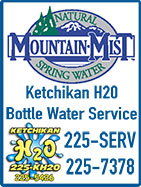

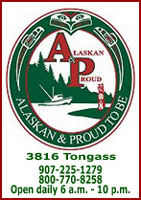





The Local Paper is now available online.
Click here for this week's printed edition.


|
|
|
![]() Contact
Contact ![]()
![]() Call 617-9696
Call 617-9696![]() Webmail
Letters
Webmail
Letters![]()
![]() News Tips
News Tips ![]()
![]() Copyright Info
Copyright Info![]() Archives
Archives![]() Alaska
Alaska![]() Ketchikan
Ketchikan![]() SE Alaska
SE Alaska![]() Alaska News Links
Alaska News Links![]() Dave Kiffer
Dave Kiffer ![]() Fish
Factor
Fish
Factor ![]() Money Matters
Money Matters ![]() June Allen
June Allen![]() Dave
Kiffer
Dave
Kiffer![]() Louise
B. Harrington
Louise
B. Harrington![]() Ketchikan
Arts
Ketchikan
Arts![]() Ketchikan
Museums
Ketchikan
Museums![]() KTN Public
Library
KTN Public
Library![]() Ketchikan Links
Ketchikan Links![]() FAA Accident Reports
FAA Accident Reports ![]() NTSB
Accident Reports
NTSB
Accident Reports![]() Court Calendar
Court Calendar![]() Recent Filings & Case Dispositions
Recent Filings & Case Dispositions ![]() Court Records Search
Court Records Search![]() Wanted:
Absconders
Wanted:
Absconders![]() Sex Offender Reg.
Sex Offender Reg.![]() Public Notices
Public Notices![]() Today's
Forecast
Today's
Forecast![]() KTN
Weather Data
KTN
Weather Data![]() AK
Weather Map
AK
Weather Map![]() AK Weathercams
AK Weathercams![]() AK Earthquakes
AK Earthquakes![]() Ketchikan
Ketchikan![]() Yellow
Pages
Yellow
Pages![]() White
Pages
White
Pages![]() Local Government
Local Government![]() State & National
State & National









































